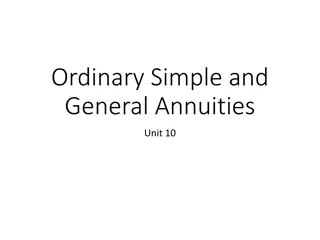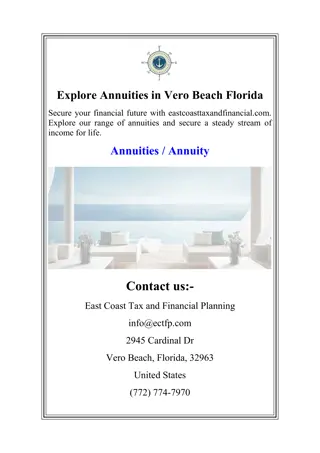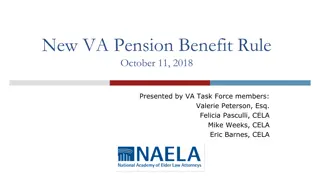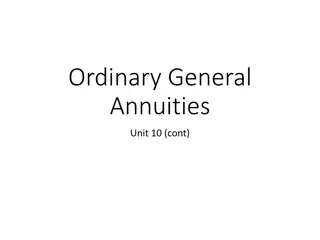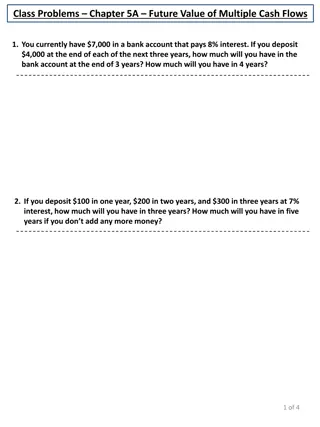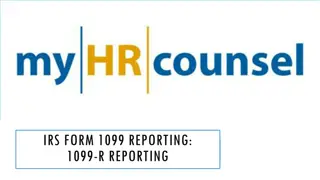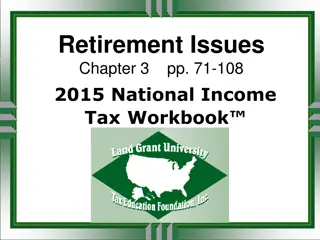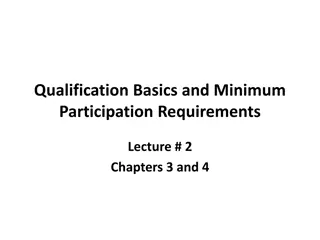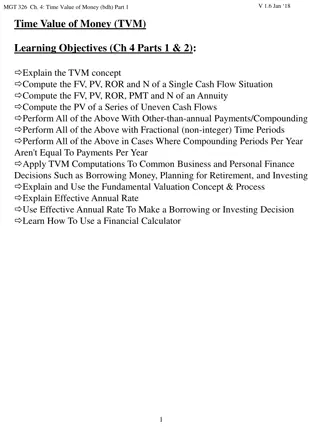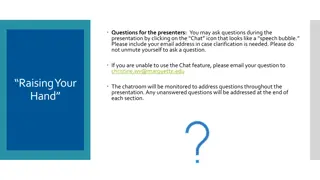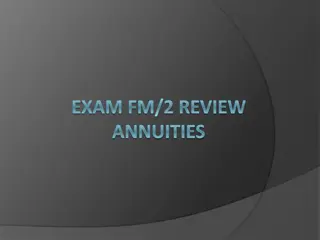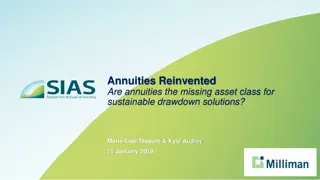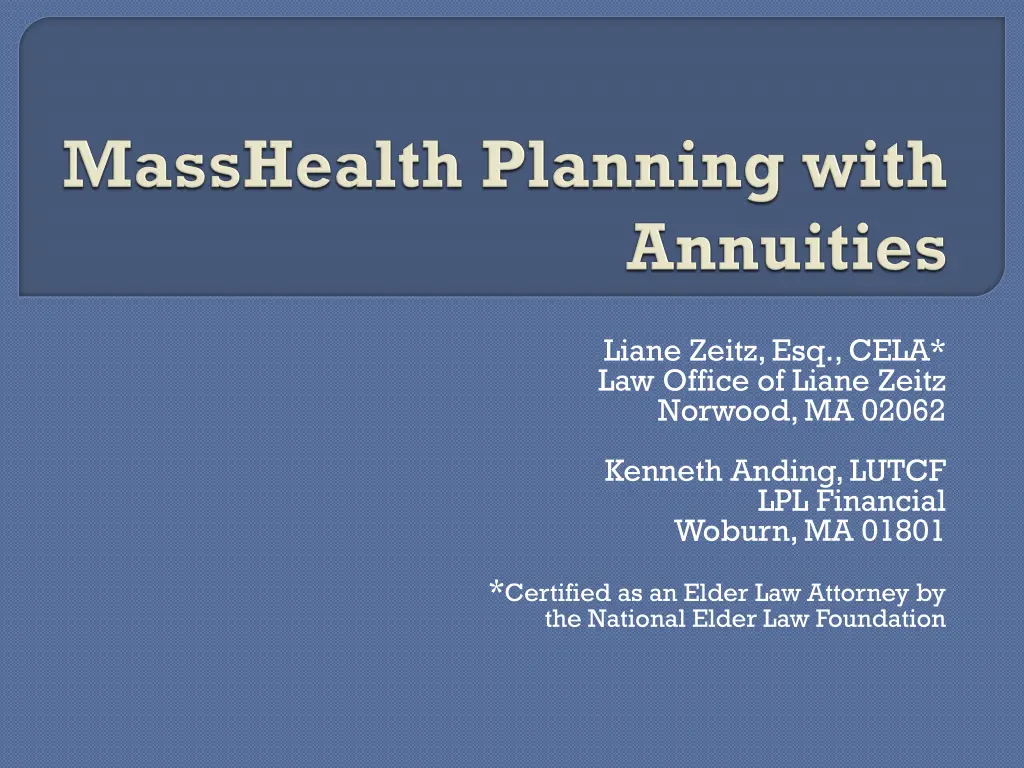
Understanding MassHealth Eligibility Rules and Estate Recovery Strategies
Dive into the complexities of MassHealth eligibility rules and estate recovery strategies, including countable assets, disqualification criteria, and recovery options for benefits paid. Learn about protecting assets, dealing with liens, and navigating the legal landscape to secure long-term care benefits efficiently.
Download Presentation

Please find below an Image/Link to download the presentation.
The content on the website is provided AS IS for your information and personal use only. It may not be sold, licensed, or shared on other websites without obtaining consent from the author. If you encounter any issues during the download, it is possible that the publisher has removed the file from their server.
You are allowed to download the files provided on this website for personal or commercial use, subject to the condition that they are used lawfully. All files are the property of their respective owners.
The content on the website is provided AS IS for your information and personal use only. It may not be sold, licensed, or shared on other websites without obtaining consent from the author.
E N D
Presentation Transcript
Liane Zeitz, Esq., CELA* Law Office of Liane Zeitz Norwood, MA 02062 Kenneth Anding, LUTCF LPL Financial Woburn, MA 01801 *Certified as an Elder Law Attorney by the National Elder Law Foundation
ELIGIBILITY RULES LIENS/ESTATE RECOVERY *MassHealth rules are complicated MassHealth is aggressively pursuing recovery for benefits paid
DEFINITIONS: Countable Inaccessible Non-Countable
Anything That Can Be Turned Into Cash Community Spouse $126,420.00 (in 2019) Nursing Home Spouse $2,000.00
Examples Cash Bank Accounts IRAs Cash Value (CSV) of Life Insurance Equity Value of all vehicles except one Real Estate (other than home)
No Legal Access (May Be Temporary) Subject To Legal Proceedings Joint Where Co-owner Refuses To Liquidate Insurance Policy In Process Of Being Adjusted Or Surrendered During Guardian/Conservator Petition Process
Home with equity value not > $878,000 Rental or Business Property Personal Possessions Burial Plot, Burial Accounts and Prepaid Funeral Arrangements One Motor Vehicle Life Insurance-face value under $1500 Pooled & Special Needs Trusts Pension funds held by employer for working spouse are non-countable SINGLE PREMIUM IMMEDIATE ANNUITIES
Disqualification for transfers made for less than fair market value Lookback period 5 years
Recovery for benefits paid (over 55 and long term care benefits) Lifetime Liens Probate Recovery
While the home is generally not a countable asset, MassHealth will place a lifetime lien on real estate except in limited circumstances MassHealth will recover if property is sold during member s lifetime. Lien expires upon death, but subject to probate recovery
MassHealth named as beneficiary on trusts or on annuities stay tuned .
MassHealth recovers from any assets that pass through Probate Court. MassHealth must be notified when petition to probate is filed.
Converts asset into an income stream for the benefit of the community spouse or nursing home resident Funds are no longer a countable asset Income payable to spouse doesn t count Income payable to nursing home resident reduces MassHealth lien NOT A DISQUALIFYING TRANSFER i.e. not a gift to the annuity company!
Beneficiary must be applicant/member or spouse Must be actuarially sound Must be immediate (payout within 60 days) Must be irrevocable and non-assignable Commonwealth must be named as a beneficiary - stay tuned .
Why Purchase an Annuity? Retirement (Qualified) Funds
Preserve Assets Income Stream for the benefit of the community spouse Example Excess countable assets of $100,000. Spouse purchases and annuity for $100,000. Nursing home resident eligible for MassHealth on date of purchase Spouse receives income from annuity
Establish MassHealth Eligibilty Reduce MassHealth recovery preserve assets for heirs Example Home plus excess assets of $100,000. Nursing home resident purchases $100,000 annuity. Annuity income paid to nursing home as part of patient paid amount, reduces MassHealth lien. When resident dies, MassHealth recovers from annuity. Lien <$100,000, house and extra funds preserved for benefit of heirs
Slightly Different Rules 1035 Exchange BUT must still name Commonwealth as a beneficiary
Term/Rate of Return Beneficiary Designations Liens/Estate Recovery
Must Be Actuarially Sound Life Expectancy Tables Reasons to Opt for Shorter Term
How much is too much.? Fact specific Need of family members spouse, disabled child? Sufficient funds to pay privately
The purchase of an annuity will be considered a disqualifying transfer of assets unless . . .the Commonwealth of Massachusetts is named as the remainder beneficiary in the first position for at least the total amount of medical assistance paid on behalf of the institutionalized individual 130 CMR 520.007(J)(2)(a)
MassHealth used to allow spouse to purchase annuity without naming Commonwealth. Commonwealth could be added as beneficiary if spouse later needed LTC Litigation in MA and other jurisdictions
MassHealth requests that applicant sign tracking form agreeing to name Commonwealth of Massachusetts as beneficiary Regulations state that Commonwealth must be named for at least the total amount of medical assistance paid on behalf of the institutionalized individual WHAT DOES THAT MEAN?
What happens when community spouse dies while annuity is in payout? MassHealth aggressively pursuing recovery Does MassHealth have a right to recover for benefits paid for the spouse? Can MassHealth recover for benefits paid after the death of the community spouse? Increased burden on annuity companies many companies exiting the market
SOLE BENEFIT - Federal Statute and State Regulations do not disqualify transfers for the sole benefit of the community spouse The MassHealth agency considers the following transfers permissible. . . The resources were transferred from the spouse of the nursing-facility resident to another for the sole benefit of the spouse. 130 CMR 520.019(D)(2)
Hughes v. McCarthy Morris v. Oklahoma Dept. of Human Services Litigation pending in MA
Beneficiary Designation If spouse purchases annuity, does Commonwealth have to be named?
Pooled Trusts Supplemental Needs Trusts ( <65) Transfers to Disabled Child Transfers to Trust for Disabled Person Increased Spousal Allowance Long Term Care Insurance Life Insurance
Liane Zeitz, Esq., CELA* Law Office of Liane Zeitz Norwood, MA 02062 (781) 326-5005 lzeitz@lzeitzlaw.com Kenneth Anding, LUTCF LPL Financial Woburn, MA 01801 (781)569-5882 kenneth.anding@lpl.com *Certified as an Elder Law Attorney by the National Elder Law Foundation


